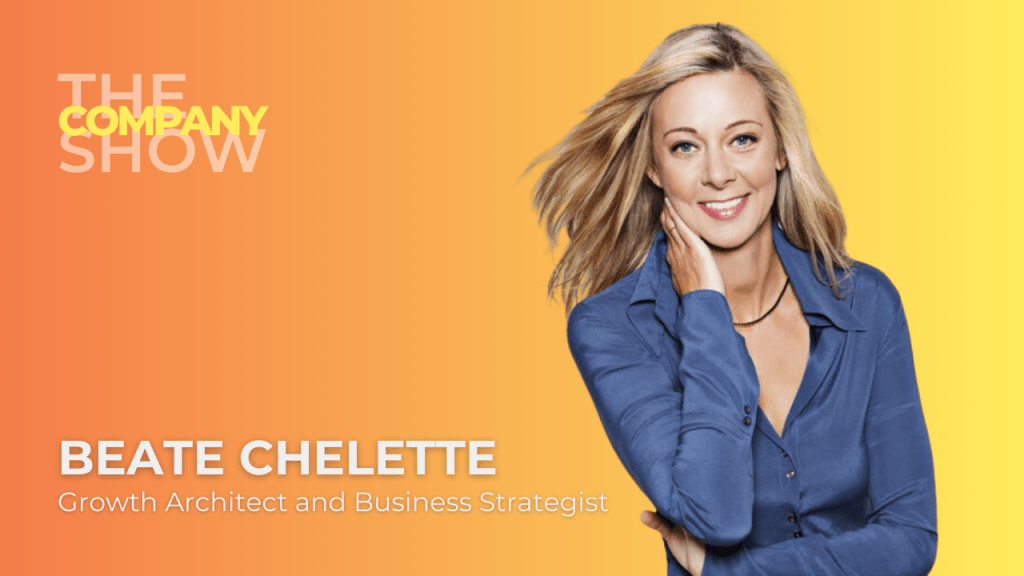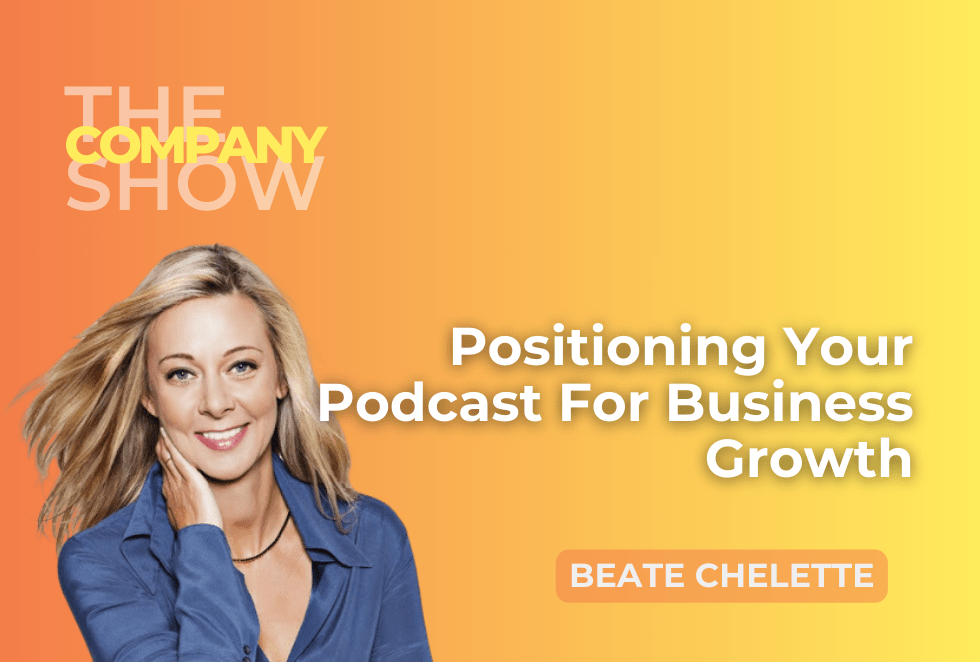Aligning your podcast with your business goals is crucial for success, which means you need to set clear podcast goals, choose the right format to achieve those goals, and understand industry best practices.
Today I have the pleasure of sharing with you a conversation that I had with Beate Chelette, the Growth Architect. She’s a business strategist and podcast host who provides visionaries and leaders with strategies to grow their authority so they can scale their impact.
Beate and I are talking about changes in the entrepreneurial landscape, having a good understanding of what’s going on in your industry and making decisions accordingly, and a good deep dive into the good, the bad, and the terribly ugly of different podcast strategies that we have run across over the years of being in this industry.
So we’re operating from the same foundation: podcasts can be leveraged within a business in a way that serves the business itself, listeners, and everyone else involved with the project. But we approached many things in somewhat different ways.
This was a conversation I learned a lot from, and I think you will too. Listen to the episode below, or continue reading the blog post!
Tune in to the full episode to learn about:
- The importance of aligning podcast with business strategy
- Using podcasting to build authority and relationships
- Focusing on quality guests and professional production standards
- Strategic guest selection and promotion
- The long-term nature of podcasting for branding and lead generation
- Patience and consistency in building audience and reputation
Don’t forget to join us for our free monthly strategy calls on the third Thursday of every month!
Strategic Podcasting: Aligning Your Show with Business Goals and Industry Standards

If you’re listening to this podcast, then I probably don’t need to convince you that your podcast’s purpose, format, and role within your company should be aligned with the products and services you offer.
Knowing that and executing well on it are different things, however, and when you’re doing that kind of assessment about your show, there’s a lot to keep in mind.
First, your podcast goals should be business goals—more networking, more sales, lower costs, and more attention—and the format you choose needs to be one that makes it possible for you to achieve your goals. You can’t network in a show without guests, and guests don’t always help you communicate your own unique ideas and viewpoints.
Second, while you want to keep an eye and an ear on what similar podcasts in your space are doing, it’s less so that you can do something similar and more so that you have a good sense of what best practices and content quality standards are in your industry. You don’t want to be the legal podcast with the worst audio and a broken call-to-action link. Understanding the baseline standards for podcasts in your industry is going to help you create a show that reflects well on you and your company.
Finally, relationships and how you are building pipelines for different kinds of them are a huge part of podcasting for your business. Whether you need more collaborators, staff referral partners, clients, or even new vendors, your podcast can put you in touch with these people, but if you’re not doing any kind of follow-up, or your follow-up isn’t systematized, those relationships aren’t going to turn into anything meaningful.
For every one of these elements, and dozens more, there are different ways to make clear connections to and alignment with your business, and how you are positioning yourself among all of the other creators in your industry. Different companies are going to have different tactics and reasons for them, and we’re going to be looking at them today with a truly expert guest.
Beate Chelette: The Growth Architect
Beate: “I’m known as the Growth Architect. And what that means is that I literally architect growth. I architect growth in three particular areas.
One is when you turn your talent into a business, you need the business model. Then number two, when you have the model and you’re making money, but now you need a signature growth system to have a clear differentiation factor. And number three, when you have the first two and now you need to really scale it to half a million, a million dollars, and beyond—a unique scaling system. So that’s when we come in.
My podcast is the Business Growth Architect Show and we bring strategies, we make strategies simple by breaking down all the different strategies that there are and hoping that our audience is going to find a few things that they actually feel that they can implement so that they can grow, build, and scale their business.”
The Impact of Increased Competition in the Coaching and Consulting Industry
Beate has been closely observing the increasing numbers of individuals entering the coaching and consulting industry, estimating that as many as two to three million people have left their jobs to start their own businesses.
According to her, this influx of new providers typically results in a downward pressure on costs, forcing existing providers to reduce their rates due to increased competition. She also notes that many of these new providers have backgrounds at major companies like Amazon, Google, or Meta, which can increase their perceived credibility.
The Shift Towards Entrepreneurship: COVID Impact and the Illusion of Ease

Beate: “There’s a number of factors that typically go into this. I mean, things are very cyclical. What we’ve seen is that people in COVID, especially those that were employed first were devalued, valued, overvalued, devalued, and now laid off. And that creates typically a sense of, not just hostility, but a great sense of dissatisfaction and an erosion of trust to the organizations and the institutions that have, you know, that have done that.
I mean, we know, and history has shown this over and over and over again. A lot of companies when they go and they tell you, Yeah, we are all DEI—diversity, equity, inclusion—we are all for equal pay. We are all for no child labor. But as an investor, I get those shareholder reports, and I get the things that are proposed on the shareholder reports to be voted on, and there are things that I voted on.
Our DEI reports and child labor reports, and the board always, without any exception on every single one of them, always votes against them. So the company, through the outside always says, Yeah, yeah, yeah, no, no, no, no. We are all for equal pay. But then, when the shareholder report says, Hey, should we vote on an actual report to demonstrate that that’s the truth? The shareholder recommendation is do not do that by the board of directors. So we know that companies lie.
I mean, you know, you can call it whatever you want, but if I was going to bet on my cellphone, bet on, let’s say General Motors or Meta or Google, I know where my bet would be safer, and I think that’s what’s happening.
The other thing is that the market is at a point now where people say, well, how hard can it be? How bad can it be out there? And so they don’t know all this stuff that can go wrong yet. You know, I call this very uncelebratorily, the bucket full of shit that can go wrong. The longer you are in business and the longer you’re alive, the bigger the bucket is, but if you haven’t had that experience, you don’t know that.
So your bucket is relatively empty, and because of that, you go like, how hard can it be? Because you don’t know how difficult it can be to be an entrepreneur. So they just go ahead and say, well, I mean, gee, you know, it’s actually really cheap. All I have to do is go get a DBA and it’s like $40, and then publish the thing for $40 and boom, and I’m done and I have my own business.”
Understanding Market Trends and Competitor Activities
Beate suggests that there are two main approaches you can take.
1. Completely ignore the competition
She believes that it has absolutely no relevance to your own operations. She gives the example of a pizza place in her office building that was always busy and popular, mainly serving the local schoolchildren and their parents.
However, when a new place opened across the street and started selling pizza by the slice—something the original pizza place didn’t do—the children started flocking there instead. The original pizza place, which didn’t adapt to the change in the market, ended up losing business.
2. Pay attention to what your competitors are doing and what’s happening in the market
Why? You might start to see some trends. As an example, she points out that high ticket sales are falling off because people have purchased a lot when they received government assistance, and now they’re looking for more practical implementation or certification.
In response to these trends, Beate suggests that businesses may need to add a low ticket offer, target a different market, or adjust their current market. It’s important to realize that what your market wanted six months ago might not be the same as what they want now.
Strategies for Monitoring Industry Trends
According to Beate, maintaining a healthy curiosity is crucial. She stresses the importance of staying informed about key players in your industry. She subscribes to many of her colleagues in the industry, even those who are big internet marketers. However, she admits that she can only tolerate being on their list for around three months at a time, due to the overwhelming amount of information they send out and how quickly they burn their list.
Despite this, Beate finds value in seeing what they’re discussing, what they’re launching, and what challenges they’re addressing. She also keeps an eye on their tactics, whether they’re still conducting webinars, calling it training, or using workbooks or action guides. She feels it’s important to understand the terminologies they’re using, as they might be relevant at the moment.
Aligning Your Podcast with Your Business Model
Beate: “If you are serious about your podcast, it has to tie into your business model to some extent. I’m sure you come across this all the time where people say, Well, I like my podcast, but it really has nothing to do with my business. And then you go, Why? That doesn’t even make any sense.
And it’s really not that difficult to tie it in by sometimes, just tweaking it. So I spoke to somebody yesterday, you know, and he is a Christian. His business is helping ministries grow, and then he has his podcast. And his podcast has seemingly nothing to do with it. And I said, That’s so easy to combine for you.
All you have to do is say to the ministries that you’re helping, this is the case study, and then add that as an offer to what you’re building for them and say, So what we did for ourselves is we built this to showcase how easy it is to grow your audience and your ministry by utilizing a podcast, and boom, suddenly the podcast wasn’t a passion project.
Suddenly, the podcast was an extension of a business model. Then I had spoken to somebody who had had a business podcast, and it was all about the battle. And I was like, you know, I gotta tell you, the battle has a really negative connotation for a lot of people.
And when I talked to him, he was focused on his business on family businesses and creating legacy. I said, just rename the podcast to Battle for Legacy. Now you can have a battle because now it’s in a positive connotation that here’s the family man battling environment, government, and IRS to preserve a legacy for his family.
So a lot of times, there’s a really easy tweak. So if you use your podcast, which you must to build your authority, the first step is that it has to directly correlate to what it is that you’re doing. So we are strategists, we architect growth. So the show is the Business Growth Architect Show. And because we are strategists, it’s about strategies.
That could be a mindset strategy, a business strategy, a sales strategy, or all kinds of strategies. But ultimately, the podcast is a business strategy podcast because it has to tie into that, and then all your follow-up also has to tie into it, because if your business is to architect growth and your podcast is to architect growth, then your offer must be to architect growth.”
Integrating Podcasts into Your Sales Cycle and Marketing Strategy
Beate: “So there’s, there’s two ways we go about it. We either have people that elevate us or we have people that are potential clients, and we often, after the podcast, we follow up with a brainstorm strategy, discovery kind of session where I make a very honest proposition, and I say that because I’m a business strategist, I would like to return the favor, which I would be saying to you, and I would like to put my head into your business and strategize on your business.
Now, I have to be very careful when I do that because even if it smells like a sales call, you will know because you are in the business and you can smell a sales call from probably five miles away.
So if I say this to you and then I don’t mean it, then you’ll go, Yeah, you know, she was an okay guest, but that really was kind of like awkward. So I have to be very clear about my intention to say, if I’m here to serve as a podcast guest to your audience, I’m in service. Then I want to be in service to you because I know what your mission is: to provide this to your audience.
I know a little bit about you because we have now spoken for a half hour. Then I can go and I can put my brain into your business without holding anything back, because if I do, then it’s a sales call. So I have to be intentional about if I’m really here to serve, to say
Hey, Megan, if this was a really good experience and you see now what I can do and who I am. Do you know somebody who might need me? Or is there something in here that you might need?
And then you can say yes or no, and then we’ll kind of move on. But that’s how you start building these referral pipelines and these lead generation pipelines. You just have to be clear that not everybody you speak to is actually going to be a client today.
There are, you know, some people are not ready yet. Some people never even thought about it. Some people need to do other things and some people are just not your right clients. So I think that when we look at the sales cycle, we also have to be clear what we are using our podcast for because there are some people out there are using the podcast for hardcore sales tool where you actually speak to a salesperson and on the podcast they take you through their sales script.”
Guest Expectations and Contributions: Lessons from Powerful Figures

Beate: “I learned something a very long time ago because, you know, I did sell my business to Bill Gates and I’ve been around some very, very powerful people in my life, and after all, I’m in Los Angeles.
I’ve been in photography, so I’ve been around a few people. People who are really, really at the top are their word. That’s why they’re there. It’s the imposters that are full of shit, and there’s no way around it. Because if I meet a Mark Cuban and a Mark Cuban tells me something, believe me, that gets done.
It is the people who want to appear like they’re Mark Cuban are the problem. So you put it out there, you do a good show, and you deliver on your promise, and then you hope that they’re professional enough to keep their word. And most of the time, that seems to be the case. I mean, they’re not going to promote this show as much as they would if they were on Joe Rogan’s show, obviously, because it’s a smaller show.
But, you know, I take it seriously. I tell them I take it seriously. Ask them what they want to get out of it. And then I am my word, and my expectation is that they are their word. Now if they unsubscribe, which a lot of people shockingly really do, so they want to go on your podcast, you know, they get the first invitation, they unsubscribe from your list.
So they’ll never get another message on scheduling links for podcasts. So they automatically unqualified themselves, and I have no more patience for this between you and me. I mean, if you can even stay on the list long enough to have the interview and get the assets, if that’s all you really want is use me, I don’t want to have you on my show because you’re not my caliber person, but then there are exceptions.
You know, I just spoke to Matt Rider from 7th Level, which is a sales organization. He’s the CEO—probably one of the best salespeople out there right now. And I know he is not going to be on my list, but I want him on my show because I know his following is enormous.
So I will make exceptions for that. And we do ask the company, because he doesn’t go through a service; he goes through a placement service, and we do ask that placement service to make sure that this goes out there, the placement service, because that’s their job. Now we are talking.
And so I think you just have to really evaluate that because if he pays for this to get these types of interviews on shows like mine or shows like yours, then that company that places it in their best interest to get that word out, that that actually did happen. Otherwise, that would be not credible.”
Evaluating Podcast Performance and Building a Reputable Platform
Evaluating Podcast Performance and Building a Reputable Platform
Beate: “In my world, in growth architecture, we talk about authority platform building and not about celebrity status or influencer status.
Because influence and celebrity status are two completely different things. Chances that you’re listening to this and you’re going to have a podcast similar to Joe Rogan are negative 400,000—and that’s beneficial for you because that’s only one.
When you go create this, you have to have a business plan for this. What’s the plan for this? So when people start their podcast and say, Oh, I’m gonna monetize it, I’m gonna get all these ads…, you know, good luck with that. Because a typical advertiser, what, pays you $200 per episode? That doesn’t even cover the cost of production. And then you get four episodes. So it’s $800 a month. What are you going to pay from that? Nothing.
So the podcast is an extension of a strategy of authority-building. It is most likely an audience that you would not normally get because people who listen to a podcast are different than people looking on YouTube, are different people that reading blogs, are different than people that are on LinkedIn.
People that listen to podcasts typically drive in their car, hey have long commutes, and they’re just looking for something that helps them, educate them, entertains them. So you have to be clear about who your audience is and who you’re doing it for. Now, if your idea is, of course, you want to see the podcast grow, but let’s just put this in the lowest denominator possible.
Let’s say 50 people download your podcast every week—that is 200 people. Or maybe it’s 75 people or a hundred people, depending how many repeats you have that are listening to this message regularly. That’s a number you would not normally have gotten. Now, if I would tell you, Hey, go down to your local Chamber of Commerce and every week you could speak in front of an audience of 50 business owners and get your message out, would you do that?
You’d be all over that. You’d go like, Oh my God, 50 people. That’s amazing. Well, you have 50 people. We tend to poo-poo the impact that we are making because you don’t know who’s really listening. So the evaluation of podcasting is really, it’s a long game. That’s what I’m learning, and it’s a long game because you have to build your own reputation.
You have to build your reputation as a host. You have to build a reputation with the quality of guests you have. You have to build a reputation in the quality of the production. It has to sound professional. You’ll be shocked how many people don’t even have a professional microphone.
I put it on my profile now, I said, do not apply unless you have a professional microphone or you are willing to invest 50 bucks in it. And I had a person say to me, What if I’m not willing to make this investment? Then I said, Then I will be not making my investment into getting your message out on my show.”
The Value of a Small and Dedicated Podcast Audience
At One Stone Creative, we’ve worked with shows that are, if you just look at the downloads, tiny, unsuccessful, and going nowhere, but they can attribute tens of thousands of dollars of business every year to having the show and deploying it within their sales funnel and their customer service team, and it’s profoundly valuable.
Who cares if the downloads are small? For most of the shows we produce, we don’t even look at the downloads. It doesn’t matter.
Beate agrees with this:
“I think it’s an ego thing. I mean, sure, I would like to go and see thousands and thousands of downloads and see the podcast grow like that, but you have to trust that if you’re enjoying it, if you have a good message, you’re also building these relationships with these people. I mean, you just never know who’s listening. All you need is one person a year who hears something, who becomes a good client, and everything’s paid for.”
More From Beate Chelette

Check out the Business Growth Architect Show for insights on business strategies. They’ve recently launched a new quiz called What’s Your Talent Worth? The intention behind this is to aid people in figuring out their actual earning potential in this market. What the participants often discover is a discrepancy between the number they’re currently earning and their potential number.
Check out her links: Website | Instagram | LinkedIn | Facebook | Twitter
Final Thoughts
This was such an interesting call, and I really enjoyed getting another perspective on the sometimes controversial strategy of the guest-to-client pipeline. I like the way Beate is approaching it, and yes, she did send me a follow-up, which I am very much looking forward to. Make sure to check out her podcast, The Business Guest Architect Show, wherever you enjoy podcasts.
Relationship-building pipelines, whether you’re seeking new clients or different kinds of professional relationships, are two-sided; you can create them by having guests on your show and being a guest on others.
Pitching yourself can be a time-consuming and sometimes daunting choice, and there are lots of professionals ready to help, of varying levels of quality. As you’ve just heard, you do not want to be that guy. If you’re looking for a guest pitching service, I highly recommend The Podwize Group, created by my friend Angie Trueblood. Angie joined me on this podcast in its previous iteration and participated in the Podcasting for Business Conference last November. She shared some excellent tips for pitching yourself effectively as a host. Here’s a quick piece of advice for you:
You can get all of the recordings of the last Podcasting for Business Conference right now at https://pfbcon.com/, and if you do, you’ll find more than 20 expert talks that will help you make real improvements. to the impact your podcast is creating.
Key Quotes
“All you need is one person a year who hears something, who becomes a good client, and everything’s paid for.” – Beate Chelette
“Who cares if the downloads are small? Most of the shows we produce, we don’t even look at the downloads.” – Megan Dougherty
Resources
One Stone Creative | LinkedIn | Twitter | Facebook | Instagram
Make sure to check out our free Monthly Strategy Calls!
Podcasting for Business Conference 2023 Recordings
Learn about what other business podcasters are doing:
Beate Chelette Website | Instagram | LinkedIn | Facebook | Twitter
- Listen to her podcast: Business Growth Architect Show
- Take the quiz! What’s Your Talent Worth?
Angie Trueblood Instagram | LinkedIn | Twitter | The Podwize Group | Go Pitch Yourself Podcast
Related:
- Does Your Podcast Format Match Your Podcast Goals?
- Case Study: Growing a Media Business Through Podcasting with Rayna Rokicki
- How to Measure the Impact of Your Podcast
PFBCon 2023 Recordings
Whether you’re a solopreneur, manager of a department, principal at a firm, or a non-fiction author ready to expand into audio, the Podcasting for Business Conference will help you leverage a podcast to meet your business objectives.
Missed PFBCon 2023? Check out the recordings!

